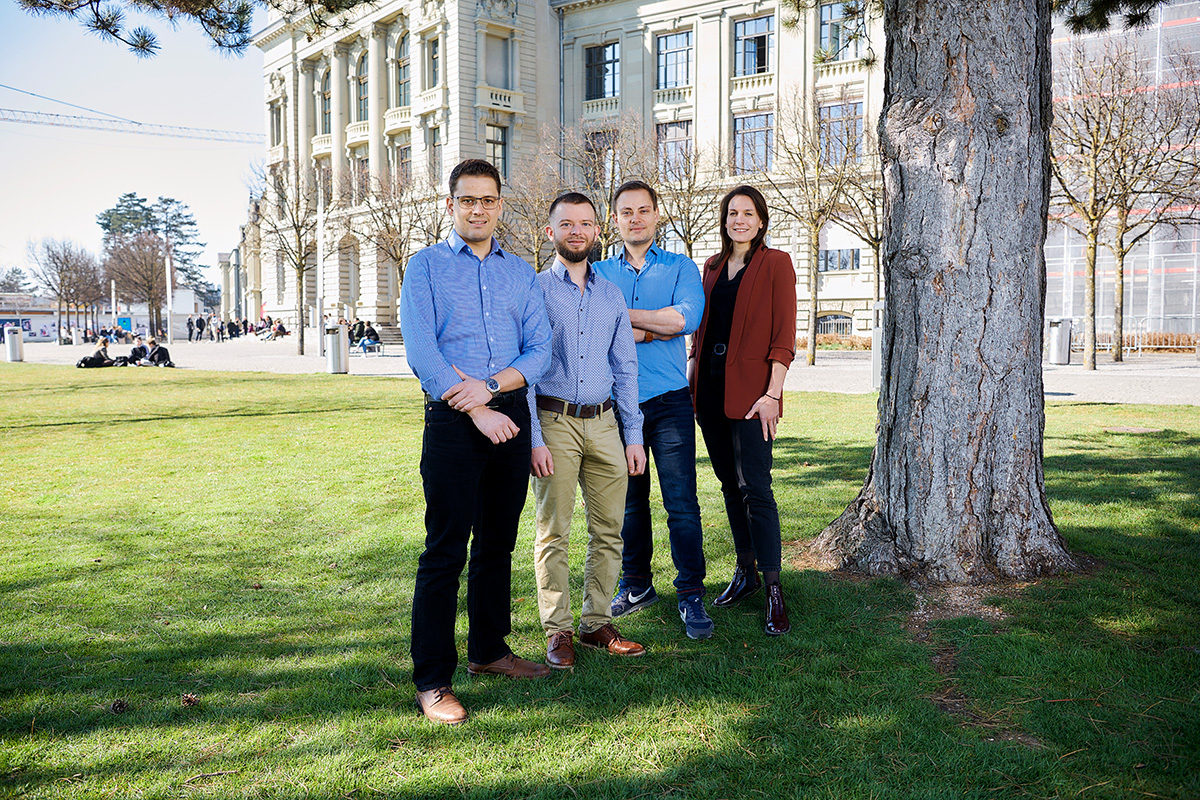First UniBE Venture Fellowships have been granted
For the first time, the University of Bern has awarded four "UniBE Venture Fellowships" to support entrepreneurial young researchers and their promising innovation projects: two are dedicated to combating antibiotic resistance, one to liver disease therapy and the fourth to improved psychotherapies.

The Fellowship program enables the four young researchers for one year to continue their translational research, on which the innovation is based, in order to validate its technical feasibility (Proof-of-Concept) and to prepare its commercialization. In this respect, the Fellows are supported by the Innovation Office, in cooperation with be-advanced AG, the local startup coaching platform. Each grant amounts to 100’000 Swiss francs and is funded collaboratively by the University of Bern, the ARTORG Center for Biomedical Engineering Research and the Inselspital, Bern University Hospital. Moreover, the Swiss Federal Institute of Intellectual Property (IPI) supports the program with an assisted patent search and an assisted patent landscape analysis.
In this first edition of the program, eleven applications were received. Six candidates were invited to present their respective project in a virtual pitch session before a jury. The jury was composed of representatives of the University of Bern, the Inselspital, Bern University Hospital, and experts of the Swiss startup ecosystem.
Showcasing four inspiring Venture Fellows and their projects:
Dr. Olivier Schären, scientific collaborator at the Institute for Infectious Diseases (IFIK), is developing a genetically modified life vaccine to fight avian pathogenic E. coli. A first market study has shown that E. coli infection of livestock is costly for producers and is currently treated with antibiotics. With the spin-off project Santella, Schären and his team are developing a new vaccine, based on the research conducted during his PhD studies, to lessen the use of antibiotic treatments and thereby contribute to combating antibiotic resistance.
In the same line, PhD student Matheus Notter is also committed to fighting antibiotic resistance. In the framework of the Interfaculty Research Cooperation (IRC) “One Health” of the University of Bern, substances have been discovered which fight the bacteria Helicobacter pylori. This bacterium can be found in the stomach and leads to chronic gastritis, peptic ulcers, and gastric cancer. With the planned spinoff Enzoxa, Notter and his team is looking to introduce on the market a novel treatment against this pathogen. His research is a collaboration between the Institute of Plant Sciences (IPS) and the Institute for Infectious Diseases (IFIK).
Psychologist Florence von Gunten and her team are developing an internet-based application for psychotherapists called ILAH, which allows for a continued therapy of patients on daily basis. The effectiveness and the efficiency of the therapy will be improved thanks to automatically generated therapeutic advice in between the in-person sessions. The advantages of this Blended Psychotherapy approach were illustrated in the research work of Prof. Thomas Berger at the Institute for Psychology. He was recently awarded with the Marcel Benoist Prize for his internet-based psychotherapy program. Lastly, ILAH will enable the collection of important therapy-specific information for the purpose of quality assurance.
Dr. Felix Baier, currently a postdoc at the Department of Visceral Surgery and Medicine at the Inselspital, Bern University Hospital and the University of Bern, is conducting research on new treatment methods for cholestatic liver diseases. Typical symptoms of cholestasis are jaundice and itchiness, which emerge when the digestive fluid (bile acid), produced by the liver, is unable to flow into the intestines. Roughly 10 percent of all liver transplantations in Europe are linked to this disease.
Short biographies of the four UniBE Venture Fellows 2022
Dr. Felix Baier
Felix Baier is a postdoctoral fellow in the Visceral Surgery Research Laboratory in the Department for BioMedical Research (DBMR), where he works closely with Inselspital, University Hospital Bern. He completed his PhD at the Graduate School for Cellular and Biomedical Sciences (GCB) of the University of Bern summa cum laude in 2019.
Matheus Notter
Matheus Notter is PhD candidate at the Institute for Infectious Diseases (IFIK), with specialization in microbiology. He will defend his PhD thesis in May 2022. Notter obtained his Bachelor in Biomedical Sciences at the University of Fribourg and his Master degree in Biomedical Sciences from at the University of Bern.
Florence von Gunten
Florence von Gunten was awarded the Master in Psychology from the University of Bern in 2020 and is currently enrolled in the MAS program in Translational Medicine and Biomedical Entrepreneurship at the sitem-insel school as well as in the MAS program in Psychotherapy of the University of Bern. She brings a lot of hands-on experience as a graduate nurse and assistant psychologist at the University Psychiatric Services Bern (UPD), amongst others.
Dr. Olivier Schären
Olivier Schären completed his PhD degree at the Institute for Infectious Diseases (IFIK) in July 2021 and is conducting now his research as a postdoc in the same institute. Previously, he obtained his Bachelor in Biology as well as his Master in Molecular Life Sciences at the University of Bern.
Innovation Office
The Innovation Office in the Vice-Rectorate Research is the first point of contact for questions related to innovation and entrepreneurship. It was founded in September 2021 to further promote a dynamic culture of innovation and entrepreneurial thinking at the University of Bern and the Inselspital, Bern University Hospital. The mandate of the Innovation Office is to support students, researchers, and faculty members in translating ideas, research, and inventions into innovations. Thereby, the Innovation Office strengthens the university’s role in creating value through knowledge for society and economy.
About the author
Sébastien Hug is head of the Innovation Office at the University of Bern.